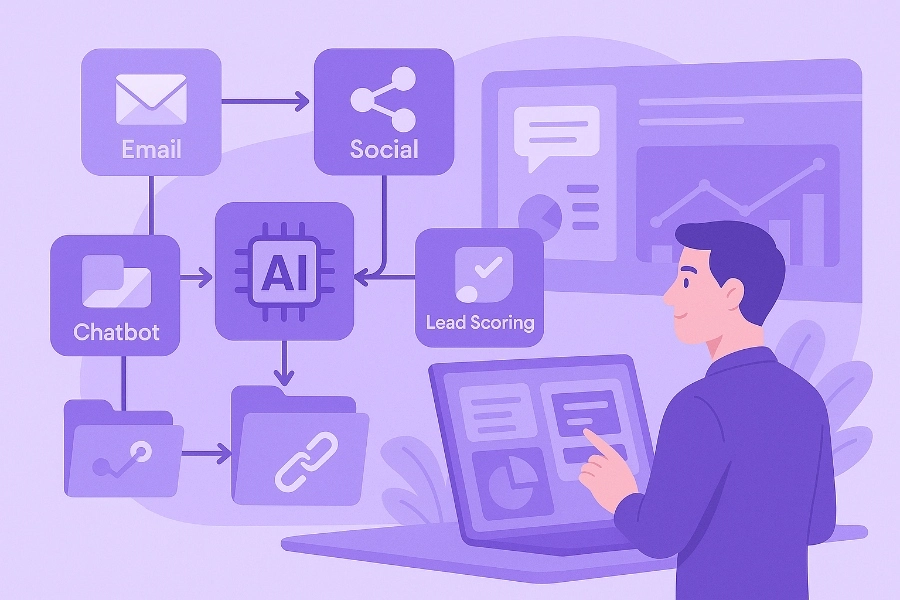Digital marketing is constantly evolving, driven by changes in consumer behavior and technological advancements. Adapting to these transformations is not just a competitive advantage but a necessity for any business looking to grow in an ever-changing digital landscape. New platforms, artificial intelligence, and automation are reshaping traditional strategies and creating new opportunities. These are the most important trends that will shape the future of digital marketing and how your company can make the most of them.
The Evolution of Digital Marketing
Digital marketing is not a static discipline. On the contrary, it is a field that is constantly being redefined by the emergence of new technologies, social changes, and evolving consumer habits. This evolution requires businesses to stay alert, be flexible, and adopt a mindset of continuous improvement. Strategies that worked five years ago may no longer be effective today, and staying on top of innovations is crucial to avoid falling behind. Let’s explore how these changes are impacting the way brands connect with their audience.
Changes in Consumer Behavior
Today’s consumers have higher expectations than ever before. They seek personalized, fast, and relevant experiences, especially on mobile devices. Immediacy has become the standard, and brands that fail to provide quick responses lose relevance quickly. The rise of voice searches and the use of artificial intelligence in tools like Siri, Alexa, or Google Assistant have changed how users interact with brands. This evolution forces businesses to optimize their content not only for traditional search engines but also for conversational interfaces, prioritizing natural and accurate responses.
New Platforms and Tools
The digital landscape is constantly expanding. The emergence of platforms like BeReal and Threads offers opportunities to connect with younger audiences in authentic and original ways, far from traditional advertising formats. At the same time, automation tools are rapidly advancing, making processes such as creating personalized campaigns in Google Ads or audience segmentation in Meta Ads easier. These technologies allow brands to act with greater precision and reduce advertising waste, maximizing the impact of each investment.
Artificial Intelligence and Automation
Technology based on artificial intelligence and automation has become a cornerstone of modern marketing. It not only saves time and resources but also improves personalization, real-time decision-making, and campaign efficiency. As tools become more accessible, even small businesses can implement advanced solutions to compete with larger market players. Let’s see how these innovations are changing the way marketing strategies are designed and executed.
AI Applied to Digital Marketing
Artificial intelligence has transformed the marketing landscape. From chatbots providing instant customer service to tools like ChatGPT generating quality content in seconds, AI is helping brands become more efficient, consistent, and scalable. Predictive analytics enables companies to anticipate consumer needs and design more effective strategies in real-time. With specialized solutions like AI-powered marketing automation, businesses can automate interactions, segment audiences, and optimize processes with a level of precision unimaginable just a few years ago.
Marketing Process Automation
Automation is key to optimizing efforts and resources. A great example is automated email marketing, which allows businesses to build strong relationships with customers without constant manual intervention. Moreover, automation enables the creation of workflows that integrate multiple channels—such as social media, ads, and email—in a coherent way. This boosts conversions by delivering personalized messages at the right time, improving both operational efficiency and the user experience.

Content Marketing for SEO
One of the most effective strategies for attracting organic traffic and building user trust is content marketing. Through useful and optimized publications, brands can position themselves as industry leaders, answer audience questions, and attract potential customers without relying solely on advertising. Let’s explore the pillars that support this approach.
Creating Valuable Content
In an information-saturated world, valuable content becomes a key differentiator. Publishing articles, guides, or studies that genuinely help your audience not only improves your ranking but also reinforces your brand’s credibility. Companies with a strong SEO strategy can attract qualified traffic and turn visits into real business opportunities. This type of content acts as a long-term asset, generating sustainable results over time.
Optimizing Content for Voice Search
Voice searches are booming and require a different approach than traditional SEO. Writing content that answers specific questions, uses natural phrases, and has a conversational structure is essential for virtual assistants to recommend your page. Additionally, content must be adapted to long-tail and contextual queries, which can significantly boost your online visibility in an increasingly competitive environment.
Video Marketing: An Essential Tool
Audiovisual content has become a vital element in any digital marketing strategy. It not only captures attention immediately but also conveys emotions, educates, and converts more effectively. Furthermore, social media algorithms increasingly favor video formats, making it a high-impact tool to enhance reach and engagement.
The Rise of Short Video on Social Media
Social networks like TikTok, Instagram Reels, and YouTube Shorts are leading the consumption of visual content. Short and dynamic videos have become a key resource to grab the attention of younger audiences who value immediacy and authenticity over traditional formats. Companies from all sectors are using these formats to share high-impact messages in just seconds, and well-targeted campaigns via Meta Ads are showing especially high returns in these environments.
Using Video Content to Boost Sales
Tutorials, product reviews, and interactive videos not only build trust but also increase conversions. Incorporating video content into your marketing strategy can help you stand out in a competitive market, especially when optimized for mobile devices. Video allows you to visually showcase benefits, reinforce brand storytelling, and increase time spent on your site—enhancing both user experience and search engine rankings.
Programmatic Advertising and Personalized Ads
In the era of hyper-personalization, programmatic advertising stands out as one of the smartest and most efficient ways to reach the right audience. This technology combines real-time data with automation to deliver highly relevant ads with unprecedented precision. Let’s analyze how it can help you optimize your advertising investments.
Optimizing ROI with Programmatic Advertising
Programmatic advertising uses real-time data to place ads in front of the right people at the right time. This approach not only improves efficiency but also maximizes return on investment (ROI). Thanks to advanced platforms like Google Ads, brands can automate bidding, optimize creatives, and measure results with great accuracy. This enables more informed decisions and near real-time strategy adjustments, increasing campaign profitability.
Segmented Ads
Advanced segmentation allows you to create personalized campaigns based on user interests, location, or behavior. This level of personalization is essential for connecting with specific audiences and increasing the relevance of advertising messages. With tools like Meta Ads or Google Ads, companies can tailor their messaging to each customer profile, improving click-through and conversion rates by speaking directly to the interests of each target group.
User Experience (UX) and Its Relationship with SEO
Beyond creating valuable content or designing effective campaigns, it’s essential to ensure users have a smooth experience when interacting with your website. A good user experience not only improves conversion metrics but also directly influences search engine rankings. Here are the most relevant aspects.
Load Speed and Mobile Navigation
A fast and mobile-optimized website not only improves user experience but also has a direct impact on SEO. Factors like load speed, responsive design, and visual stability are critical to ensuring users stay longer on your page. Google increasingly considers these aspects as quality signals, and neglecting them can seriously hurt your rankings.
Seamless User Experience
A smooth and well-structured navigation is essential for attracting and retaining users. Elements like intuitive design, fast response times, and a clear information flow shape the perception of your site’s quality. Additionally, by applying best practices in landing page design, you can maximize the conversion of visitors into customers. These factors also help improve key metrics like bounce rate, average session duration, and content interaction.
_________________________
Prepare for the future of digital marketing and discover how we can help you implement the latest trends so you don’t fall behind. Contact us and we’ll help you take your business to the next level.



0 Comments